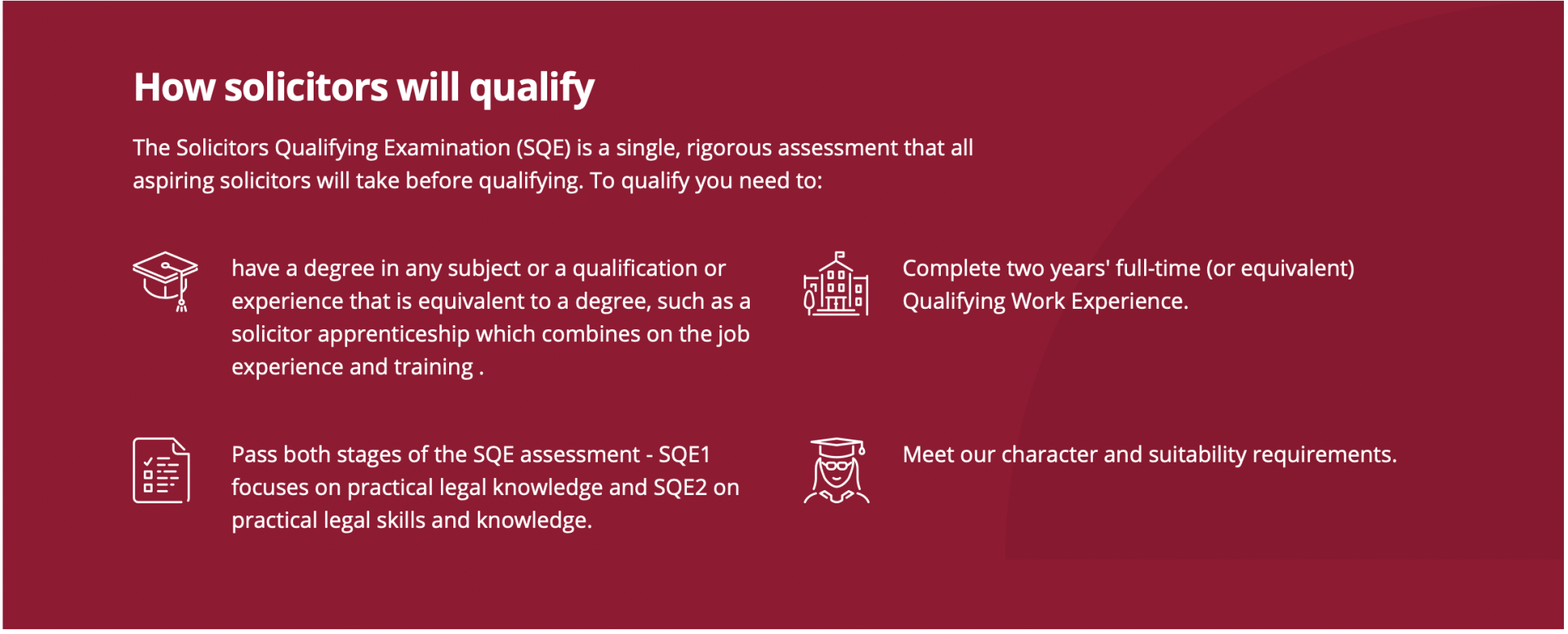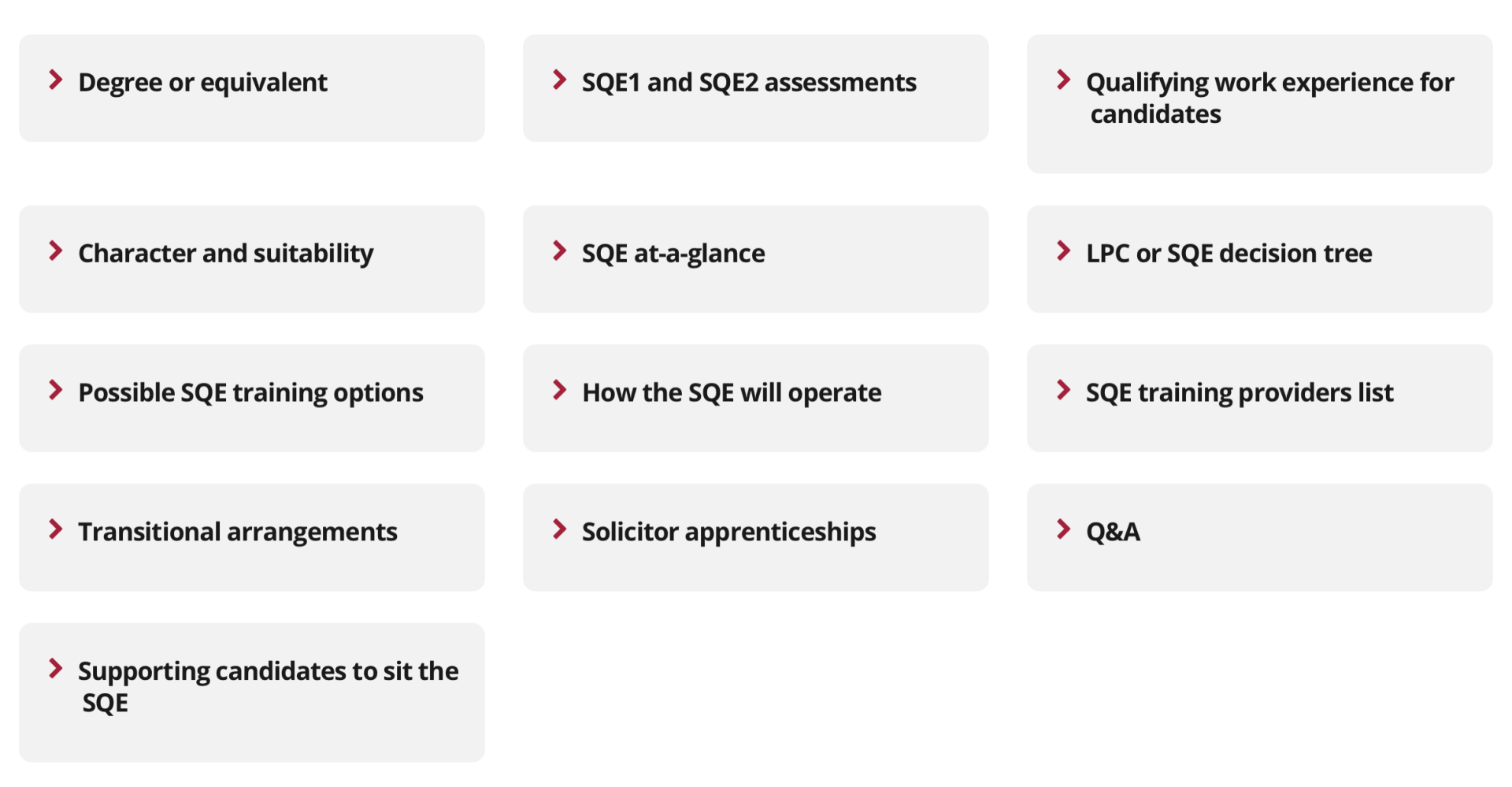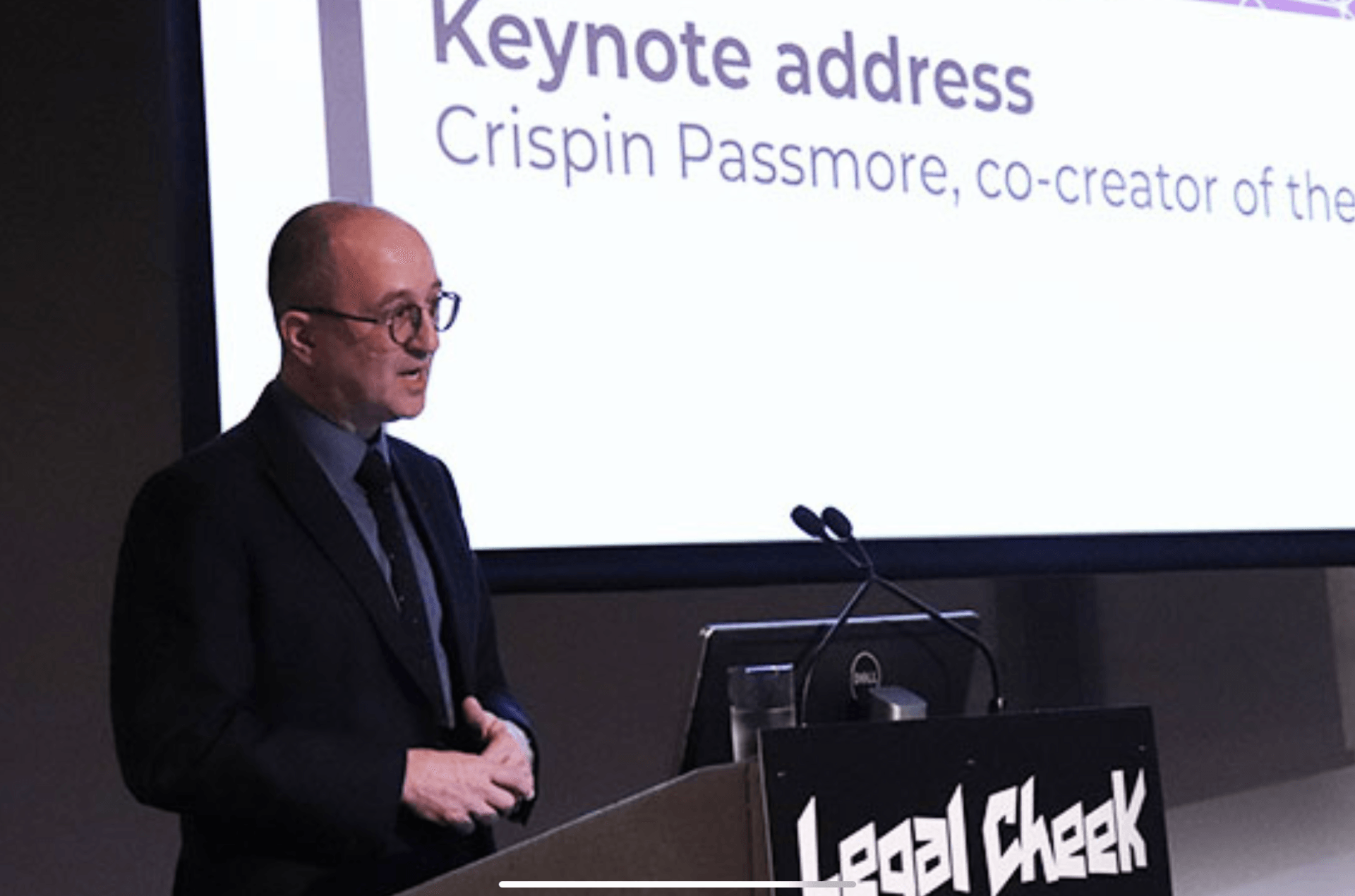Search results for 'SQE' (14)

I have blogged several times on the introduction of Solicitors Qualifying Examination (SQE). I have made the point that SQE shifts power towards trainees and candidates by removing law firm or solicitor control on the number of people that qualify as solicitors. To refresh, a paralegal or aspiring solicitor does not need their employer’s permission to learn the skills, gain the knowledge, develop the behaviours and build the experience to pass SQE. What the candidate does need is a solicitor or the firm’s Compliance Office for Legal Practice (COLP) to 'sign-off' (the correct term is confirm) the qualifying work experience (QWE). That raises some issues and, in my view, some confusion that I want to tackle. In particular I hear that some law firms are making a policy decision to not confirm QWE for some paralegal cohorts of their staff. That should be explored and challenged. What is the solicitor or COLP confirming when signing the relevant form for a period of QWE? They are not confirming that the aspiring solicitor is good enough to become a solicitor. They are not passing or failing the aspiring solicitor. They are not saying that the candidate was competent. In signing off a period of QWE the solicitor or COLP is confirming to the SRA: • The length of work experience carried out. • That the placement provided the opportunity for the individual to develop some or all of the competences outlined in the Statement of Solicitor Competence. • That no issues arose during the work experience that raise questions over the individual's character and suitability to be admitted as a solicitor or if such confirmation cannot be given, then details of any such issues. None of this is to say that competence or breadth of knowledge do not matter. Rather it is that the new system shifts that assessment from thousands of law firms and solicitors (a system that does not provide any comfort to the regulator on consistency and standards) to a centralised assessment. So why might a law firm decide, as a matter of policy, that it will not confirm an aspiring solicitor’s QWE? There are two broad groups of aspiring solicitors in a law firm. The first is the cohort that the law firm has decided are on an ‘official track’ to qualification – what they still seem to call training contracts. The other group are the paralegals that are employed to do legal work. Those paralegals may be in the core of a law firm, in its onshore managed legal services arm or elsewhere in the business. There is of course no SRA mandated ‘official track’ to qualification – that is one of the liberalisations or flexibilities built into SQE. Firms may select people to follow their internal route to gaining QWE and preparing for SQE assessments, but that is not an ‘official’ route. Candidates from the paralegal side of the business will no doubt think that if their work falls within the definition of QWE it would be absurd for firms to block that counting by refusing to confirm it. I would add that there is something very odd about a law firm having a policy of confirming QWE for people it has selected as aspiring solicitors but refusing the same to candidates who are forging their own path, using their entrepreneurial effort to own and develop their own career. That doesn’t even begin to examine the potential discrimination law issues that might arise from treating these two groups differently. I suspect that law firms might be worried about the burden of supervising and confirming QWE. If that were the case they would be wrong. They are already supervising their paralegals. And if they are a good employer they will also be focused on developing their people. Refusing to confirm QWE for paralegals risks the law firm looking (at least to its staff and potential recruits) that they do not really value their paralegals. At a time that alternative legal service providers are exploring how to use SQE to attract and develop paralegals, offering them a route to qualification, it would seem an own goal for law firms to hand that point of difference to their competitors. If a law firm has lots of aspiring solicitors in its workforce it should be pleased. Most employers make a lot of effort to up-skill their workforce and would be a jealous of an employer with lots of staff taking the initiative and driving their own development. Perhaps law firms fear that they will just be helping paralegals to leave once they qualify. Better to think about how they might retain those that qualify – that requires a rethink of workforce strategy and probably a little blurring of the boundary between paralegal, trainee solicitor, newly qualified solicitor. It always struck me as odd that law firms are more focused on qualifications than job role – what they’ve done rather than what they do. The SRA in its guidance on QWE highlights that the confirmation requires some sort of due diligence but it is not burdensome: • Directly supervising the individual's work (although this is not a requirement of confirming QWE). • Reviewing the individual's QWE training template, training diary, learning and development record or work portfolio to make sure they had the opportunity to develop some or all of the competences. You may want to check that the experience claimed has been appropriately evidenced. For example, does the experience described or provided relate to the competence. • Confirming with your organisation's HR team that the placement details are accurate and whether any character and suitability issues arose. • Speaking to the person or persons directly supervising the individual's work. There are also ways to minimise any perceived or real burdens on firms and their supervisors. They can encourage their staff to use an online journal to record their QWE in a standardised format. Flex offers an SQE QWE journal that is easy to use and can help candidate and supervisor alike. It provides functionality that allows candidates to record their QWE, reflect on their experience and be SRA ready. Why wouldn’t a law firm want its paralegals to be doing this? Firms worried about the burden could even ask Flex to manage their paralegals QWE on their behalf – it just needs a bit of imagination. With a little investment it is possible even to design reward and retention packages that include development towards qualifying as a solicitor. It seems to me a bad idea to refuse to confirm paralegals’ QWE as a matter of policy. I also think it risks putting a firm and supervising solicitor in breach of their regulatory obligations. The SRA has said this about a solicitor not confirming QWE: Consider whether you are you complying with our Principles and Code of Conduct for Solicitors to act honestly, fairly at all times and not to abuse your position by taking unfair advantage. For example, refusing to confirm QWE that meets our criteria simply in order to retain an employee in a non-qualified position would be a clear breach of our Principles and Code. We may take action against a solicitor or COLP who does not meet their regulatory obligations when confirming QWE that meets our criteria. [My emphasis]. So refusing to confirm QWE (that meets the SRA’s requirements) is not only a bad idea it isn’t very ethical. If this is a policy decision that is being taken then those firms and solicitors should rethink.

SQE has an impact across the legal market and I have covered it many times. But today I focus on what it means for GCs and in house teams. Get this right and the GC can better align training, workforce and team development with the business needs. Ignore it and get stuck with homogenous solicitors trained at city law firms.

An edited version of this short blog first appeared in The Times Brief on Thursday 15 July 2021 (paywall). After a decade of review, consultation and design, the solicitors qualifying examination takes its first bookings this month for its November sitting. Traditional law firms have worked hard to update graduate recruitment programmes in advance, while less traditional legal businesses will see opportunities to do much more and develop an entirely different approach to training solicitors. The use of paralegals and contract lawyer platforms to deliver managed legal services and supplement in-house teams is now well established ( FLEX , Axiom , Elevate , Obelisk , Factor for example). Regulatory changes mean that these businesses are now able to employ solicitors that directly advise clients. There are battalions of paralegals that want to become solicitors and the new exam offers them a cheaper and more flexible path to qualification. Many of these alternative providers, such as at least one of the “big four” accountancy practices ( KPMG ), are already offering training that is faster and cheaper than the traditional route. Those with a steady supply of talented paralegals will be able to offer new routes to qualification because the work experience element of the reformed process is less prescriptive — studying can be done alongside work and the costs of education and exams are much lower. Business like FLEX are making it easier for paralegals to be in control of that, and for firms to manage it, with tools such as their qualifying work experience journal. Over the next ten years there will be a significant increase in the number of solicitors qualifying and the exam will help these alternative legal service providers attract and retain more recruits. It will help them to develop the quality and credibility of their services with better trained workforces — and as supply increases, it may also push down the salaries of newly qualified solicitors and thus the costs of delivering legal services. The growth of alternative providers increases choice for general counsel at corporations who no longer just buy from the firm where they trained and, as a result, the new businesses are able to attract more complicated legal work. Ultimately, some of those providers will be granted the status of alternative business structures, (see Elevate Next UK for example). which they can staff with lawyers that they have trained. In the process they will march directly on to the territory of traditional City law firms. Those firms can respond and some are already well placed to do so ( BCLP Cubed or Pinsent Mason Vario for example). They need to create structures that are pipelines for diverse talent into top law firms rather than stress that working in their their alternative offer is not a route to a training contract. Salaries of £100,000 may be justifiable for elite young professionals, but if that is a law firm’s only strategy for training solicitors then they are in effect abandoning large-scale and routine work to the alternative providers and retreating up the value chain. Strategy for law firms won’t be driven by the new exam or indeed any other of the regulatory reforms of the last ten years. But they provide an important context, and law firm leaders need to develop more modern workforce strategies to compete.

The Government has published the results of its Integrated Review into the Security, Defence, Development and Foreign Policy. How can that matter to lawyers and the legal market? This blog identifies the key issues and opportunities for regulators and law firms. They range from promotimg solicitor as a global brand and standard in support of UK soft power, to law firms need to tackle money laundering more actively.

2021 is the year SQE will be sat for the first time. The legal education market is already changing. It will change faster as law firms and legal business drive a stronger focus on what they and their workforce need. In this blog I explore how different market segments might respond to SQE and how the flexibility it offers might be used.

The SRA has been a strong and effective market regulator, if not always popular. It has often been ahead of the legal market, or at least with its cutting edge to try and facilitate a competitive and innovative legal market. During the current health crisis it seems to have gone to sleep. What might we expect the SRA to be thinking about and what should it be prepared to do?

Companies are being asked to increase home working at exactly the same time as facing major legal issues and even existential crisis from consumer service, redundancy and short time working, health and safety issues, remote working, contractual disputes and re-negotiations, financial , banking and regulatory matters. Does a flexible and experienced in house lawyer suddenly seem attractive to small business not used to working with lawyers? There is a growth in flexible lawyering and the extension of it to in-house solicitors such as through The Legal Director might be a sign of the future.

I recently gave the keynote address at Legal Cheek's LegalEdCon North. I talked about the changing legal market, the opportunities and growth that this brings, and what it means for regulators, educators, employers and students. The legal market is increasingly dynamic and practice is varied: that means that innovators can thrive and new models emerge.

Alongside the new centralised assessment called Solicitors Qualifying Examination, changes to the qualifying work experience requirements take effect. A much wider range of legal work will count towards the two years, supervision is still by an authorised lawyer but sign off as 'competent' is for the regulator rather than the supervisor. They will bases that upon SQE performance. These changes mean that training contracts will not be the bottle neck they currently are. So power shifts from law firms to students. If you are good enough to pass SQE you can be a solicitor regardless of any particular firm wanting to offer a training contract. I predict more solicitors, working in different ways with more diverse legal businesses and delivering more services.

The Solicitors Qualifying Examination is already making law firms rethink their approach to training during what they still call the training contract. But they should leave this to their graduate recruitment and HR teams. That will allow them to focus on the strategic issues that used to be beyond reach because of regulatory prescription. Law firm leaders should be leading their business to better align workforce strategy behind the business strategy. 'Son of LPC' will prepare solicitors for yesterday, while SQE gives an opportunity for law firm leaders to deliver solicitors and a wider workforce that helps them deliver whatever their clients want tomorrow .

The Solicitors Qualifying Examination is coming and the first exams will be sat in late 2021 That means firms need to be thinking about their response now - 2021 will be too late. A quick review of the opportunities the SQE offers leads us to see that law firms really need to identify strategic questions about their workforce, their business strategy and how they interact. The question for law firm leaders is simply, 'should I lead or follow'?

I am leaving the SRA at the end of 2018 in order to set up my own consultancy business. I will be helping law firms and legal business, solicitors and regulators across the UK, the USA and beyond. My 25 years experience in the legal market, at the heart of the last ten years regulatory and market reforms, give me lots to offer. But is it a good time to start a consultancy? Time will tell.


